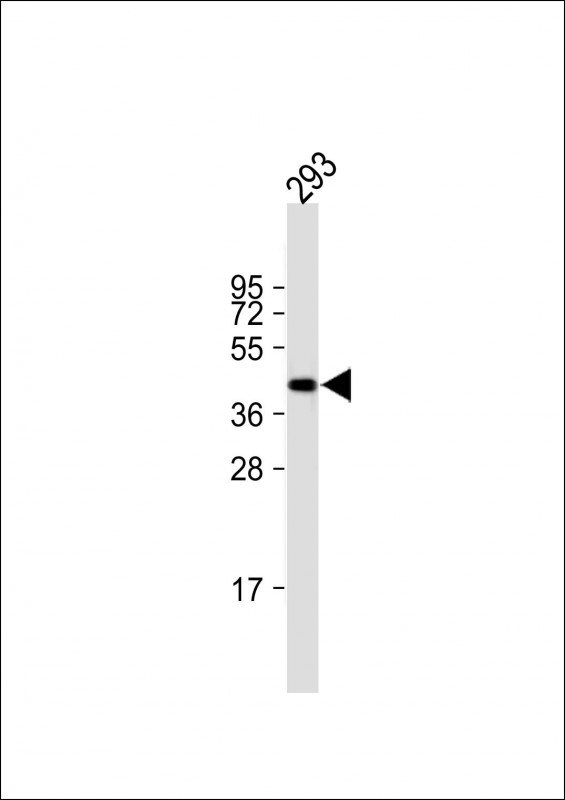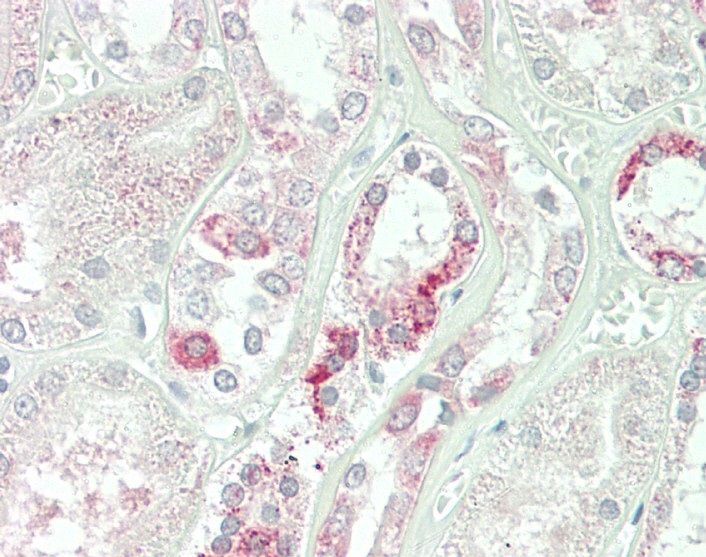

| WB | 咨询技术 | Human,Mouse,Rat |
| IF | 咨询技术 | Human,Mouse,Rat |
| IHC | 1/100 | Human,Mouse,Rat |
| ICC | 技术咨询 | Human,Mouse,Rat |
| FCM | 咨询技术 | Human,Mouse,Rat |
| Elisa | 咨询技术 | Human,Mouse,Rat |
| Aliases | Glycoprotein-N-acetylgalactosamine 3-beta-galactosyltransferase 1, B3Gal-T8, Core 1 O-glycan T-synthase, Core 1 UDP-galactose:N-acetylgalactosamine-alpha-R beta 1,3-galactosyltransferase 1, Beta-1,3-galactosyltransferase, Core 1 beta1,3-galactosyltransferase 1, C1GalT1, Core 1 beta3-Gal-T1, C1GALT1 |
| Entrez GeneID | 56913 |
| WB Predicted band size | 42.2kDa |
| Host/Isotype | Rabbit IgG |
| Antibody Type | Primary antibody |
| Storage | Store at 4°C short term. Aliquot and store at -20°C long term. Avoid freeze/thaw cycles. |
| Species Reactivity | Human, Mouse, Rat |
| Immunogen | This C1GALT1 antibody is generated from rabbits immunized with a KLH conjugated synthetic peptide between 115-144 amino acids from the Central region of human C1GALT1. |
| Formulation | Purified antibody in PBS with 0.05% sodium azide. |
+ +
以下是关于C1GALT1抗体的3篇参考文献,按文献名称、作者和摘要内容简要整理:
---
1. **文献名称**:*C1GALT1 overexpression promotes the aggressive phenotype of colon cancer cells in vitro and in vivo*
**作者**:Ju, T., et al.
**摘要**:该研究利用C1GALT1特异性抗体,通过免疫组化和Western blot技术,揭示C1GALT1在结肠癌细胞中高表达与肿瘤转移的相关性,证实其通过调控O-糖基化修饰促进癌细胞侵袭。
---
2. **文献名称**:*Regulation of C1GALT1 expression and its role in pancreatic cancer progression*
**作者**:Hassan, H., et al.
**摘要**:研究通过C1GALT1抗体检测胰腺癌组织中该酶的表达水平,发现其与患者预后不良相关,并证实其通过影响黏蛋白糖基化促进肿瘤微环境重塑。
---
3. **文献名称**:*Aberrant O-glycosylation modulated by C1GALT1 contributes to immune evasion in hepatocellular carcinoma*
**作者**:Wang, Y., et al.
**摘要**:使用C1GALT1抗体分析肝癌样本,发现肿瘤细胞通过上调该酶改变表面蛋白糖基化模式,从而逃避免疫监视,为靶向治疗提供潜在策略。
---
如需更具体的研究方向或更新文献,建议在PubMed或Google Scholar中以“C1GALT1 antibody”或“C1GALT1 immunohistochemistry”为关键词检索。
C1GALT1 (core 1 β3-galactosyltransferase) is a key enzyme in O-glycosylation, catalyzing the formation of the T antigen (Galβ1-3GalNAcα1-Ser/Thr), a precursor for many extended O-glycan structures. This enzyme plays a critical role in maintaining glycoprotein stability, cell adhesion, and signaling. Dysregulation of C1GALT1 has been linked to diseases, particularly cancers, where altered O-glycosylation promotes tumor progression, metastasis, and immune evasion. For instance, its overexpression in certain carcinomas correlates with poor prognosis.
C1GALT1 antibodies are essential tools for studying the enzyme’s expression, localization, and function in biological systems. These antibodies, often developed in rabbits or mice, target specific epitopes of human or murine C1GALT1. They are widely used in techniques like Western blotting, immunohistochemistry (IHC), and immunofluorescence (IF) to assess protein levels in tissues or cell lines. Validated antibodies help identify C1GALT1’s role in pathological conditions, such as its association with aberrant mucin glycosylation in gastrointestinal or ovarian cancers. Researchers also utilize these antibodies to explore therapeutic strategies targeting glycosylation pathways or to evaluate biomarkers for disease diagnosis. When selecting C1GALT1 antibodies, specificity and cross-reactivity across species or isoforms should be verified to ensure experimental accuracy.
×